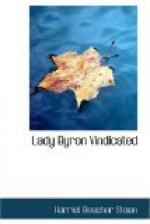All these facts go to show that Lord Byron’s character for accuracy or veracity was not such as to entitle him to ordinary confidence as a witness, especially in a case where he had the strongest motives for misstatement.
And if we consider that the celebrated Autobiography was the finished, careful work of such a practised ‘mystifier,’ who can wonder that it presented a web of such intermingled truth and lies that there was no such thing as disentangling it, and pointing out where falsehood ended and truth began?
But in regard to Lady Byron, what has been the universal impression of the world? It has been alleged against her that she was a precise, straightforward woman, so accustomed to plain, literal dealings, that she could not understand the various mystifications of her husband; and from that cause arose her unhappiness. Byron speaks, in ‘The Sketch,’ of her peculiar truthfulness; and even in the ‘Clytemnestra’ poem, when accusing her of lying, he speaks of her as departing from
‘The early truth that was her proper praise.’
Lady Byron’s careful accuracy as to dates, to time, place, and circumstances, will probably be vouched for by all the very large number of persons whom the management of her extended property and her works of benevolence brought to act as co-operators or agents with her. She was not a person in the habit of making exaggerated or ill-considered statements. Her published statement of 1830 is clear, exact, accurate, and perfectly intelligible. The dates are carefully ascertained and stated, the expressions are moderate, and all the assertions firm and perfectly definite.
It therefore seems remarkable that the whole reasoning on this Byron matter has generally been conducted by assuming all Lord Byron’s statements to be true, and requiring all Lady Byron’s statements to be sustained by other evidence.
If Lord Byron asserts that his wife deserted him, the assertion is accepted without proof; but, if Lady Byron asserts that he ordered her to leave, that requires proof. Lady Byron asserts that she took counsel, on this order of Lord Byron, with his family friends and physician, under the idea that it originated in insanity. The ‘Blackwood’ asks, “What family friends?’ says it doesn’t know of any; and asks proof.
If Lord Byron asserts that he always longed for a public investigation of the charges against him, the ‘Quarterly’ and ‘Blackwood’ quote the saying with ingenuous confidence. They are obliged to admit that he refused to stand that public test; that he signed the deed of separation rather than meet it. They know, also, that he could have at any time instituted suits against Lady Byron that would have brought the whole matter into court, and that he did not. Why did he not? The ‘Quarterly’ simply intimates that such suits would have been unpleasant. Why? On account of personal delicacy? The man that wrote ‘Don Juan,’ and furnished the details of his wedding-night, held back from clearing his name by delicacy! It is astonishing to what extent this controversy has consisted in simply repeating Lord Byron’s assertions over and over again, and calling the result proof.




